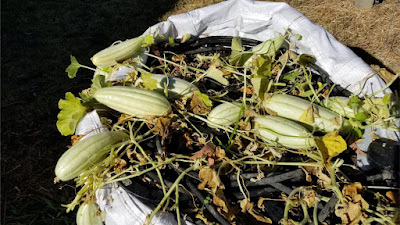For many years, I had been trying to source seeds of the Beit Sahour Faqous or Fakkous. While I have not been able to source that specific variety, I was able to source the general Palestinian Faqous from the Experimental Farm Network, which obtained the variety from Vivien Sansour of the Palestine Heirloom Seed Library.
So what is the Faqous? It is a muskmelon that is grown as a cucumber. Though it is likely listed as a Cucumis melo variety flexuous, it has some attributes of the chate variety too. When I say Cucumis melo variety flexuous, I am referring to the longer ‘snake melons’, while when I speak of C. melo variety chate or adzur, I am referring to round, oval or cylindrical varieties – like the carosello. Both the flexuous and chate varieties have very similar characteristics and flowers. The primary difference between the two has generally been the fruit length and texture. With these two characteristics, the Faqous or Fakkous is much more like a chate. My opinion is that the length and texture of the Palestinian Faqous may much more closely resemble the original cucumber-melons that were grown over a millennia ago rather than the long snake melons or some very short carosello varieties.
The Faqous exhibits a flesh color that is very light in color. While it starts out looking light green and very fuzzy, the color becomes lighter as it matures. The texture remains crisp, yet appealingly tender until the fruit becomes mature. Unlike the light snake melons known as the Armenian cucumber or Tortarello Abruzzese Bianco, the Faqous does not go from being tender yet dry to juicy but very hard. The length of the Faqous that I grew was also relatively consistent – around 8-10 inches at prime picking stage.
One of the things I did differently when I grew the Faqous was that I grew it in a 1-yard tote. The soil from a local organic soil supplier (Harmony Organics) comes with the tote, so I decided to just grow in the tote for a season. After the season, I replaced the tote with a 1 cubic yard macro grape harvest bin.
From starting the plant in May of 2022 to collecting the fruit, the plants grew well and produced quickly. Unlike a lot of other varieties I have grown, the Palestinian Faqous matured almost like clockwork. They all set fruit around the same time and were ready to harvest for seed all around the same time too. The flavor was appealing, but not my favorite. I would definitely consume it over the Armenian cucumber varieties that are sold by American seed companies, but it would probably not compete with some of my other carosello varieties. However, given the consistent growth pattern, maturity and fruiting shape – I could see this variety as being very marketable.



























































No comments:
Post a Comment
Dear Gardening Friends,
I look forward to learning more about gardening with you. Your comments help me recognize that gardening is a life-long journey.
To advertisers: Note that this blog is concerned with gardening and gardening techniques. Please do not attempt to advertise here by leaving a comment. Depending upon how egregious the comment is, it may be deleted.